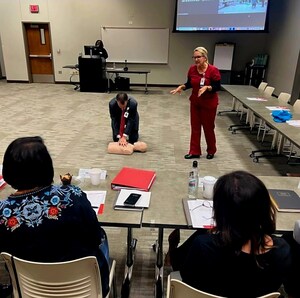Study highlights:
-- The incidence of heart disease, stroke and certain risk factors decreased as educational levels increased in high-income countries, but not in low- and middle-income countries.
-- Among women, the most educated in low- and middle-income countries had a slight increase in the incidence of heart attack and stroke.
-- Among all other groups, heart disease declined as education increased, with highly educated men in high-income countries showing the lowest level of disease.
DALLAS, Sept. 7 /PRNewswire-USNewswire/ -- In one of the first international studies to compare the link between formal education and heart disease and stroke, the incidence of these diseases and certain risk factors decreased as educational levels increased in high-income countries, but not in low- and middle-income countries.
(Logo: http://photos.prnewswire.com/prnh/20100222/AHSALOGO)
(Logo: http://www.newscom.com/cgi-bin/prnh/20100222/AHSALOGO)
Researchers — who reported their study in Circulation: Journal of the American Heart Association — also found that smoking rates unexpectedly increased with greater education level among women in high-income and low-and middle-income regions. Furthermore, highly educated women in low-and-middle-income countries had a slight increase in the incidence of fatal and nonfatal heart attack and stroke. Among all other groups, heart disease declined as education increased, with highly educated men in high-income countries showing the lowest level of disease.
In general, low- and middle-income countries have not achieved a significant degree of industrialization relative to their populations, and often have a medium to low standard of living. There is a strong correlation between low income and high population growth.
"We can't simply take studies that are conducted in high-income countries, particularly as they relate to socioeconomic status and health outcomes, and extrapolate them to low- and middle-income countries," said Abhinav Goyal, M.D., M.H.S., lead author of the study and assistant professor of epidemiology and medicine (cardiology) at Emory Rollins School of Public Health and Emory School of Medicine in Atlanta, Ga. "We need dedicated studies in those settings."
Smoking, a major contributor to heart disease and stroke, typically declines as formal education rises. But investigators found that nearly half of the highly educated women from high-income countries smoked, compared with 35 percent for those with the least amount of schooling. Likewise, low- and middle-income countries had higher smoking rates among the most educated women (21 percent versus 14 percent among the least educated).
For men, smoking rates were virtually the same across educational groups in low- and middle-income countries. In affluent countries, however, the most educated men smoked less than did men with the fewest years of formal education (66 percent versus 75 percent).
"We can't assume that just because certain groups are more educated than others that they're going to have healthier lifestyles," Goyal said. "Everyone needs to be educated about the risk of heart disease in particular, and counseled to adopt healthy lifestyles and to quit smoking."
For the two-year study, investigators assessed 61,332 patients from 44 countries with diagnosed heart disease or stroke, or several risk factors, including smoking, high blood pressure, clogged blood vessels and obesity. Thirty-six percent of participants were female, 64 percent were male, and the average age was 69. Investigators used years of formal education and previous classifications of income by world region to divide participants by socioeconomic level.
As the leading causes of death worldwide, heart disease and stroke killed an estimated 17.5 million people in 2005, according to the latest statistics from the World Health Organization. More than 80 percent of these deaths were in low- and middle-income countries, highlighting the critical need for more research in these areas.
"We are facing an increase in the epidemic of cardiovascular disease in countries with developing economies," said Sidney Smith, M.D., study co-author and professor of medicine and director of the Center for Cardiovascular Science and Medicine in the University of North Carolina School of Medicine. "What this paper suggests is that things may be different in these countries. If we're really going to develop strategies that are effective, we need to understand much better what those differences are."
Co-authors are Deepak L. Bhatt, M.D., M.P.H.; Ph. Gabriel Steg, M.D.; Bernard J. Gersh, M.D.; Mark J. Alberts, M.D.; E. Magnus Ohman, M.D.; Ramon Corbalan, M.D.; Kim A. Eagle, M.D.; Efrain Gaxiola, M.D.; Runlin Gao, M.D.; Shinya Goto, M.D., Ph.D.; Ralph B. D'Agostino, Ph.D.; Robert M. Califf, M.D.; and Peter W.F. Wilson, M.D. Author disclosures are on the manuscript.
Sanofi-aventis, Bristol-Myers Squibb and the Waksman Foundation funded the study.
Statements and conclusions of study authors published in American Heart Association scientific journals are solely those of the study authors and do not necessarily reflect the association's policy or position. The association makes no representation or guarantee as to their accuracy or reliability. The association receives funding primarily from individuals; foundations and corporations (including pharmaceutical, device manufacturers and other companies) also make donations and fund specific association programs and events. The association has strict policies to prevent these relationships from influencing the science content. Revenues from pharmaceutical and device corporations are available at www.americanheart.org/corporatefunding.
NR10 – 1116 (Circulation/Goyal)
Additional Resources:
- Downloadable stock footage and animation available at www.americanheart.mediaroom.com. Click on Multimedia and Broadcast under resources.
- U.S. Cardiovascular Disease Statistics
- International Cardiovascular Disease Statistics
- International Cardiovascular Disease Death Rates
CONTACT: |
|
Karen Astle: (214) 706-1392; [email protected] |
|
Bridgette McNeill: (214) 706-1135; [email protected] |
|
Julie Del Barto (broadcast): (214) 706-1330; [email protected] |
|
SOURCE American Heart Association
WANT YOUR COMPANY'S NEWS FEATURED ON PRNEWSWIRE.COM?
Newsrooms &
Influencers
Digital Media
Outlets
Journalists
Opted In






Share this article